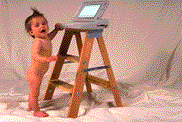|

1. Your newborn is close to becoming "mobile"
now. Child-proofing your home should be your first priority at this age.
2. Your baby is more active now, so be more
careful than ever! Do not leave him or her anyplace from which he or she can fall. Always keep one hand on your child! When
placing your child on a sofa, bed, changing table, or any other high place, never turn your back on your child, not even for
a second. Your baby always needs your full attention. Never leave your baby alone with a young sibling or pet.
3.
Wash your hands and your baby's hands, after diaper changes and before feedings. Regularly clean your baby's toys with soap
and water.
4. Continue to use a rear-facing safety seat properly secured in the back seat of the car. If using an
infant-only safety seat, switch to a rear-facing convertible safety seat intended for babies up to 40 pounds (18 kg) when
your baby weighs 20 to 30 pounds (9 to 13 kg) or is 26 inches (66 cm) long. Never place your baby's safety seat in the front
seat of a vehicle with a passenger air bag. The back seat is the safest place for children of any age to ride.
5.
Do Not Use Baby Walkers. There is considerable risk of major and minor injury and even death from the use of walkers. There
is no clear benefit from their use.
6. Install and maintain carbon monoxide detectors, especially if your home uses
gas appliances.
7. Always keep the baby's environment free of smoke. Alsso keep the home and car as smoke free zones.
8. Get down on the floor and check for safety hazards at your baby's eye level.
9. Empty buckets, tubs or
small pools immediately after use. Ensure that swimming pools have a four-sided fence with a self-closing, self-latching gate.
10. Avoid overexposure to the sun.
11. Do not leave heavy objects or containers of hot liquids on tables with
tablecloths that your baby may pull down.
12. Place plastic plugs in electrical sockets.
13. Keep toys with
small parts or other small or sharp objects out of reach. It is especially important to remind older siblings that they should
always play with small objects out of reach of their baby brother or sister.
14. Keep all poisonous substances, medicines,
cleaning agents, health and beauty aids, and paints and paint solvents locked in a safe place out of your baby's sight and
reach. Never store poisonous substances in empty jars or soda bottles.
15. Install safety devices on drawers and cabinets
where the infant may play. Install gates at the top and bottom of stairs, and place safety devices on windows.
16.
Lower the crib mattress. Continue to put your baby to sleep on her back or side5 and avoid the use of soft bedding.
17.
Avoid dangling electrical and drapery cords.
18. If you have a pet, keep his or her food and dishes out of your baby's
reach. Also, never allow your child to approach a dog while the dog is eating.
19. Do not use an infant walker at
any age. The walkers can tip over easily and carry a high risk of injury.
20. Use the playpen as an "island of safety."
21. Learn first aid and infant cardiopulmonary resuscitation (CPR). For more information visit:
Town and Country Pediatrics!
Bright Futures.Org: 0 to 11 months!
|

